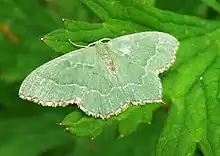| Hemithea | |
|---|---|
 | |
| Hemithea aestivaria | |
| Scientific classification | |
| Domain: | Eukaryota |
| Kingdom: | Animalia |
| Phylum: | Arthropoda |
| Class: | Insecta |
| Order: | Lepidoptera |
| Family: | Geometridae |
| Tribe: | Hemitheini |
| Genus: | Hemithea Duponchel, 1829 |
| Synonyms | |
| |
Hemithea is a genus of moths in the family Geometridae erected by Philogène Auguste Joseph Duponchel in 1829. In 1999 there were about 31 species in the genus.[1]
Description
Palpi reaching just beyond the frons in male, long in female. Antennae of male usually ciliated. Hind tibia of male dilated with a fold containing a tuft of long hair. Abdomen with dorsal tufts on three segments. Forewings with vein 3 from angle of cell. Veins 7, 8, 9 and 10 stalked and vein 11 free. Hindwings with angled outer margin at vein 4. Veins 3, 4 and 6, 7 stalked.[2]
Species
- Hemithea aestivaria (Hübner, 1789) – common emerald
- Hemithea antigrapha Prout, 1917
- Hemithea aquamarina Hampson, 1895
- Hemithea insularia Guenée, 1857
- Hemithea krakenaria Holloway, 1996
- Hemithea marina (Butler, 1878)
- Hemithea melalopha Prout, 1931
- Hemithea neptunaria Holloway, 1996
- Hemithea nigriparmata Prout, 1935
- Hemithea notospila Prout, 1917
- Hemithea obscurata (Warren, 1896)
- Hemithea ochrolauta (Warren, 1894)
- Hemithea pellucidula (Turner, 1906)
- Hemithea poseidonaria Holloway, 1996
- Hemithea sequestrata (Prout 1917)
- Hemithea subaurata Warren, 1899
- Hemithea subflavida Warren, 1896
- Hemithea tritonaria (Walker, 1863)
- Hemithea undifera (Walker, 1861)
- Hemithea viridescentaria (Motschulsky, [1861])
- Hemithea wuka (Pagenstecher, 1886)
References
- ↑ Pitkin, Brian & Jenkins, Paul (November 5, 2004). "Hemithea Duponchel, 1829". Butterflies and Moths of the World. Natural History Museum, London. Retrieved July 30, 2018.
- ↑ Hampson, G. F. (1895). The Fauna of British India, Including Ceylon and Burma: Moths Volume III. Taylor and Francis – via Biodiversity Heritage Library.
External links
- Savela, Markku. "Hemithea Duponchel, 1829". Lepidoptera and Some Other Life Forms. Retrieved July 30, 2018.
 Media related to Hemithea at Wikimedia Commons
Media related to Hemithea at Wikimedia Commons Data related to Hemithea at Wikispecies
Data related to Hemithea at Wikispecies
This article is issued from Wikipedia. The text is licensed under Creative Commons - Attribution - Sharealike. Additional terms may apply for the media files.